Trump accuses Iran of stonewalling Gaza ceasefire talks
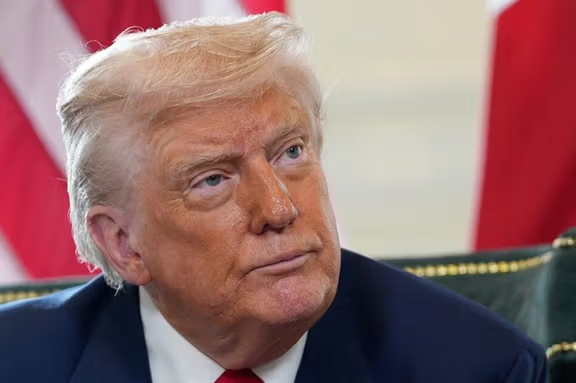
US President Donald Trump on Monday expressed frustration over stalled efforts to reach a ceasefire with Hamas in Gaza and accused Iran of obstructing the negotiations.

US President Donald Trump on Monday expressed frustration over stalled efforts to reach a ceasefire with Hamas in Gaza and accused Iran of obstructing the negotiations.
“I think they (Iran) got involved in this negotiation, telling Hamas, giving them signals and orders. And that's not good,” Trump told reporters on the sidelines of a meeting with the United Kingdom's prime minister on Monday.
His remarks appeared to be the first blaming Iran for the continuing impasse.
The latest round of negotiations with the Iranian-backed Palestinian armed group in Qatar ended without results. White House Special Envoy Steve Witkoff cut his trip short and left on July 24.
“While the mediators have made a great effort, Hamas does not appear to be coordinated or acting in good faith. We will now consider alternative options to bring the hostages home and create a more stable environment for the people of Gaza,” Witkoff announced on X.
Trump said the United States remains engaged with the Gaza issue, including plans to ensure unimpeded access to humanitarian aid amid an escalating hunger crisis and initiatives to secure the release of Israeli hostages held by Hamas.
'We'll wipe it out'
Turning to Iran's nuclear program, Trump warned that if the Islamic Republic moves toward any form of nuclear weapons capability, he will not hesitate to authorize further military strikes.
“They can start again. If they do, we'll wipe it out faster than you can wave your finger at it. We'll have to do that. We will do that gladly, openly and gladly,” Trump said.
Israel launched a 12-day military campaign against Iran on June 13, killing hundreds of Iranian military personnel, nuclear scientists and civilians. In retaliation, missile strikes by Iran killed 27 Israeli civilians.
On June 22, the United States entered the conflict by striking Iran’s nuclear facilities in Isfahan, Natanz, and Fordow using long-range bombers and submarine-launched missiles. The United Stated promptly brokered ceasefire between Iran and Israel which effect on June 25.
The Trump administration has maintained for months that it does not oppose peaceful Iranian nuclear activity but has demanded Tehran end domestic enrichment.
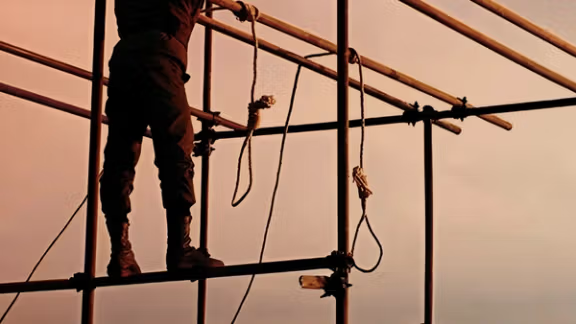
The United Nations' top human rights official on Monday urged Iran to impose an immediate moratorium on the use of the death penalty, citing a surge in executions across the country.
“Reports that there have been several hundred executions in Iran so far this year underscore how deeply disturbing the situation has become and the urgent need for an immediate moratorium in the country on the use of the death penalty,” UN High Commissioner for Human Rights Volker Türk said in a statement.
According to data gathered by the UN Human Rights Office, at least 612 people were executed in the first half of 2025. That figure is more than double the number recorded in the same period last year.
“It is alarming to see the reports that indicate there are at least 48 people currently on death row – 12 of whom are believed to be at imminent risk of execution,” Türk said.
The UN said more than 40 percent of the executions so far this year were for drug-related offences, while others were convicted under broad and vaguely worded charges, including “enmity against God” and “corruption on Earth.”
Human rights experts have repeatedly warned that such charges are often used to criminalize political dissent and suppress freedom of expression.
“Information received by my office also indicates that judicial proceedings in a number of cases, often held behind closed doors, have consistently failed to meet due process and fair trial guarantees,” the High Commissioner said.
Minority groups remain disproportionately affected by executions, the UN added, although it did not specify which groups were most at risk. Rights organizations have previously documented disproportionate targeting of Iran's Baluch, Kurdish, and Baháʼí communities in politically sensitive cases.
The rise in executions follows a wave of repression in the aftermath of the 12-day war between Iran and Israel in June.
Meanwhile, Iran’s Guardian Council is in the final stages of reviewing a controversial espionage bill that would expand the definition of “collaboration with hostile states”—an offence punishable by death.
The proposed legislation includes acts such as online communication, cooperation with foreign media, and what it terms “ideological alignment” with foreign governments.
“This bill dangerously broadens the scope of capital punishment for espionage, and I call for it to be rescinded,” Türk said.
“The death penalty is incompatible with the right to life and irreconcilable with human dignity,” he added. “Instead of accelerating executions, I urge Iran to join the worldwide movement abolishing capital punishment, starting with a moratorium on all executions.”
Iran is one of the world’s top executioners, second only to China, according to human rights groups.
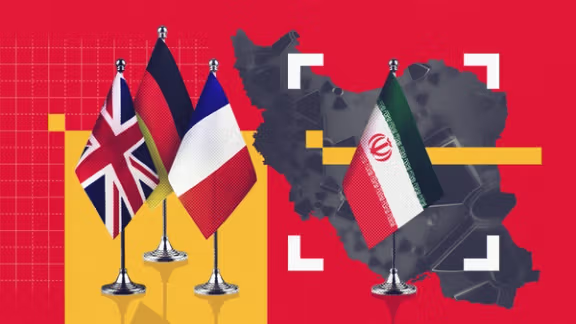
Iran opposes any attempt by European powers to activate the UN sanctions snapback mechanism, the foreign ministry said on Monday after recent nuclear negotiations in Istanbul.
“We have clearly said, and we stress, that the European parties do not have the legitimacy or the authority to invoke the so-called snapback mechanism,” foreign ministry spokesman Esmail Baghaei said during his weekly press briefing in Tehran.
Talks held with European representatives, Baghaei said, were focused solely on Iran’s nuclear program and sanctions relief.
“No other topics were raised in these negotiations,” he added.
Delegates from Britain, France, and Germany—collectively known as the E3—met at the Iranian Consulate in Istanbul on Friday for their first discussions since the 12-day war in June between Iran and Israel, during which US bombers targeted Iran's three heavily fortified nuclear sites.
Iran conveyed its opposition directly to its European counterparts to any snapback effort, according to Baghaei.
“Such a right does not exist for them, and we fundamentally reject the move,” he added.
Under the terms of the 2015 nuclear deal, known formally as the Joint Comprehensive Plan of Action, the snapback clause allows for the reimposition of UN sanctions if a participant claims significant non-compliance.
Baghaei also dismissed European narratives of the recent negotiations. “The European side has presented its own version of events, but this account does not align with the facts and differs from the viewpoint of the Islamic Republic of Iran,” he said.
Earlier on Sunday, France said it will push for sweeping global embargoes on Iran unless a broader deal is reached by the end of August covering not just Tehran’s nuclear program but its missile and regional activities.
Tehran excludes defense from nuclear talks
Iran’s nuclear negotiations with European powers remain narrowly confined to sanctions relief and atomic issues, the foreign ministry spokesman added, rejecting any suggestion of broader terms.
“These talks have a clear and limited focus: the lifting of sanctions and matters related to the nuclear program,” Baghaei said.
“Any attempt by some Western states to introduce unrelated issues only reflects their confusion and lack of coherence.”
Iran’s defense matters, Baghaei said, are not on the table and will not be subject to negotiation. “Especially under current conditions, Iran is more determined than ever to maintain and enhance its deterrent capability.”
No plans for talks with US
Iran is not pursuing negotiations with the United States, Baghaei said, ruling out direct dialogue under current conditions.
“The Islamic Republic of Iran at present has no plan to negotiate with the United States,” he added.
“Whenever national interests and necessities demand, an appropriate decision will be taken and announced.”
Blaming Israel for Zahedan attack
The Iranian diplomat blamed Israel for supporting armed groups following a deadly attack in the southeastern city of Zahedan that killed several people on Saturday.
“There is no doubt that the Zionist regime provides financial and logistical support to terrorist groups targeting Iran,” Baghaei said. “This reality has been proven repeatedly over the years.”
He described the Zahedan attack as “a clear act of terrorism” and said its goal was to disrupt public security.
“These actions are aimed at creating insecurity in Iran and threatening the safety of its citizens. This terrorist act is strongly condemned.”
Nine people, including three assailants, were killed and 20 others wounded in an armed attack on a courthouse in the city.
“These attacks are part of a broader pattern of crimes committed by the Zionist regime against Iran,” he added. “The message is clear: this regime will stop at nothing to destabilize Iran’s security.”
Iran’s judiciary chief also on Monday blamed foreign powers for Zahedan attack. “Such acts of terrorism undoubtedly originate from global arrogance, led by the criminal United States,” Gholam Hossein Mohseni Ejei said.
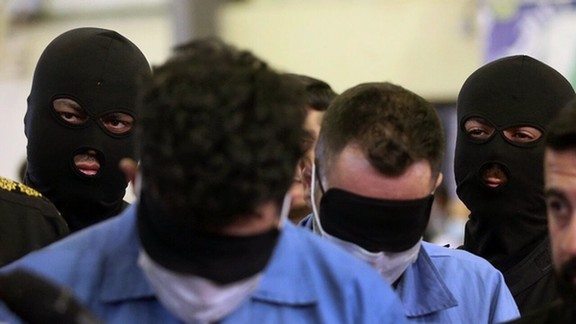
An American citizen who came to Iran to visit relatives before the outbreak of the 12-day war is among five Jews still detained on suspicion of collaborating with Israel.
The man from New York is said to have left Iran 30 years ago and was among 35 Jews in the country detained on spy charges in the wake of the war with Israel.
He had traveled to Iran along with another Jew of Iranian origin who was also arrested but was since released on bail.
Israel’s Ynet quoted a legal representative involved in the case who remained anonymous, who said: ”They came to the wrong place at the wrong time.”
Homayoun Sameyah Najafabadi, the only Jewish representative in Iran’s parliament, said Sunday that the charge of espionage has been formally dismissed against all Jewish detainees held in Tehran, and that the majority of those arrested are expected to be released soon.
“I am proud to announce that following a two-hour meeting with Mohammad Taghavi, the head of the Revolutionary Court in Tehran, it was agreed that three of the five detained members of our community will be released on light bail,” Najafabadi wrote in a statement. “We hope the remaining two individuals in Tehran will also be freed soon.”
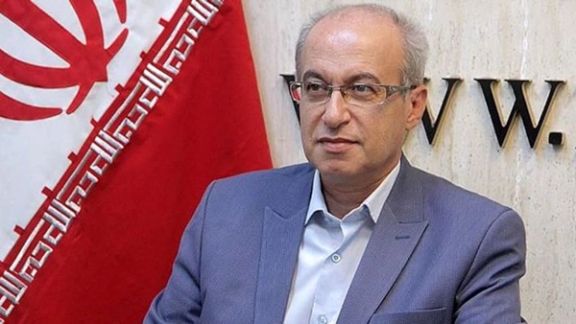
In addition to developments in the capital, Najafabadi also addressed the situation in Alborz province, where a larger group of Jewish Iranians had been detained in recent weeks.
“With regard to the eleven individuals arrested in Alborz province, I am pleased to report that... five women were released on bail last week,” he said. “Additionally, three men were freed from detention just a few days ago.”
He added that he would continue to pursue the release of the remaining detainees in the province. “Tomorrow, a meeting will be held with Ahmad Nowrouzi, the head of the judiciary in Alborz province, regarding the status of the remaining detainees.”
Najafabadi also said that efforts were underway in Shiraz concerning another community member who remains in custody. “With regard to a fellow citizen detained in Shiraz, I, along with the respected head of the Shiraz Jewish Association, am actively pursuing the matter and we hope to witness positive results soon.”
In the wake of the war, 35 Jews were arrested in Tehran and Shiraz, as well as the Alborz province, on suspicion of ties to Israel. The 10,000 strong community has long been pressured to publicly express loyalty to the Islamic Republic and is banned from communicating with relatives in Israel.
Their arrests were part of a mass crackdown, in which 2,000 Iranians were arrested, including members of other minorities including Azeris, Kurds, and members of the Baha'i faith, on suspicion of collaboration with Israel.
The US State Department’s spokeswoman, Tammy Bruce, issued a warning last month, telling dual nationals or American citizens not to travel to Iran.
The State Department website still warns: “Americans, including Iranian-Americans and other dual nationals, have been wrongfully detained, taken hostage by the Iranian government for months, and years. The threat of detention is even greater today. Do not travel to Iran under any circumstances.”
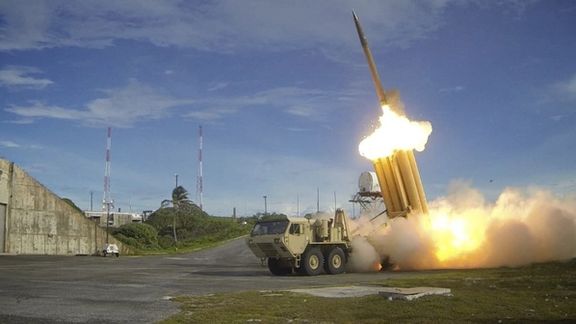
The United States expended roughly 25% of its high-end THAAD missile interceptors during June’s 12-day conflict between Israel and Iran, raising concerns about its ability to sustain future missile defense operations, CNN reported Monday.
US forces deployed two of the military’s seven Terminal High Altitude Area Defense (THAAD) systems in support of Israel, firing more than 100 -- and potentially as many as 150 -- interceptors to defend against a barrage of Iranian ballistic missiles.
The deployment marked the most significant operational use of the system to date, according to the report, which cited sources familiar with the matter.
While the interceptors successfully countered many of Iran’s long-range missiles, experts warn that the rate of usage far outpaces current production capabilities.
The US Department of Defense produced only 11 new THAAD interceptors in 2024 and expects to procure 12 more this fiscal year. The Pentagon plans to acquire 37 in 2026, according to budget documents cited by CNN.
“The reports about THAAD expenditure are concerning,” a US missile defense expert told CNN. “This is not the sort of thing the US can afford to do repeatedly. THAAD is a very scarce resource.”
A senior retired US Army officer told CNN the Department of Defense is now reassessing “wartime stockage levels of critical munitions” and working to increase annual production capacity.
A Pentagon official said the 2026 budget prioritizes “funding in the defense industrial base,” including $1.3 billion for supply chain improvements and $2.5 billion for missile and munitions production.
The Pentagon declined to specify the number of interceptors used, but Press Secretary Kingsley Wilson said, “The US military is the strongest it has ever been… look no further than Operation Midnight Hammer and the total obliteration of Iran’s nuclear capabilities.”
However, experts cited by CNN warned that stockpile shortfalls were already a concern before the Israel-Iran war and could undermine deterrence, particularly in the event of simultaneous conflicts.
Lockheed Martin, THAAD’s manufacturer, currently operates nine active batteries worldwide, seven of them under US control. Two were moved to the Middle East in recent years, with others stationed in Texas, Guam, and South Korea. THAAD systems have also been delivered to the UAE, where they’ve been used against Houthi-launched missiles.
Iran launched over 500 ballistic missiles during the war, with 86% intercepted. However, 36 missiles struck populated areas, resulting in widespread damage across Israeli cities, including Tel Aviv, according to DC-based think tank Jewish Institute for National Security of America (JINSA).
Analysis conducted by DC-based think tank Jewish Institute for National Security of America (JINSA) estimated that THAADs -- alongside Israel’s Arrow-2 and Arrow-3 interceptors -- downed 201 of Iran’s 574 missiles, with 57 hitting populated areas across Israeli cities. The report estimated that the US’ THAAD system accounted for almost half of all interceptions.
JINSA analysis said Iran increasingly deployed more advanced missiles with multiple warheads and decoys in later stages of the war, challenging interception systems. “Only 8% of Iranian missiles penetrated defenses in the first week of the war. That doubled to 16% in the second half of the conflict and eventually culminated at 25% on the final day of the war before the ceasefire.”
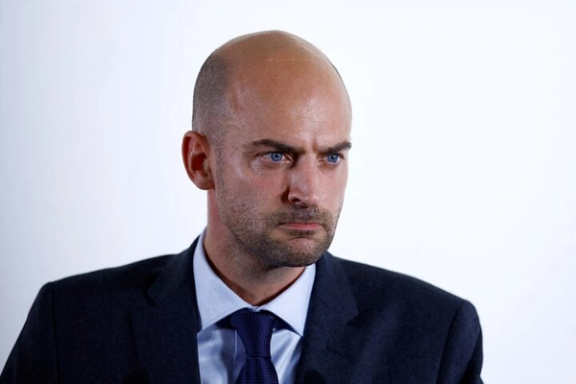
France said on Sunday it will push for sweeping global embargoes on Iran unless a broader deal is reached by the end of August covering not just Tehran’s nuclear program but its missile and regional activities.
“We now want a more comprehensive agreement that would encompass both the nuclear dimension of Iranian destabilization activities, but also it's the ballistic component, as well as the regional destabilization activities,” French Foreign Minister Jean-Noël Barrot said on CBS News’ Face the Nation.
Barrot warned that Iran’s repeated violations of the 2015 nuclear accord had rendered the previous terms obsolete.
“Unless a new and robust and durable and verifiable agreement is reached by the end of the summer, France, Germany and the UK will have no other choice but to reapply the global embargoes that were lifted 10 years ago,” he said. These include bans on arms, nuclear equipment and banking.
Barrot said Paris has been in weekly contact with US officials, including Secretary of State Marco Rubio and Special Envoy Steve Witkoff, and has supported efforts to reengage Iran diplomatically since the ceasefire following last month’s war with Israel.
“We have pressed Iran, after the 12-day war, to go back to a discussion with the US,” Barrot said. “If there is no solid agreement that can be found by the end of August, we will have no other option but to snap back.”
Once activated, the mechanism would restore all UN sanctions on Iran without the possibility of veto from Russia or China.
In Tehran, senior official Mohammad Bagher Zolghadr dismissed the threat. “Even if the snapback mechanism is activated, it has no effect and we should not be concerned about it,” he said. “The new negotiation should be about why America betrayed the talks.”
Zolghadr said that renewed sanctions would be ineffective. “Given the current state of the country, new sanctions cannot create restrictions,” he said, adding that Iran had “discovered methods rendering sanctions obsolete.”